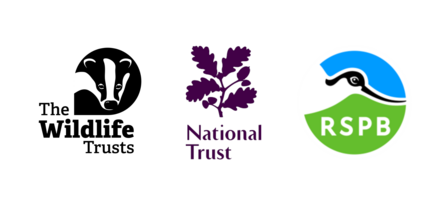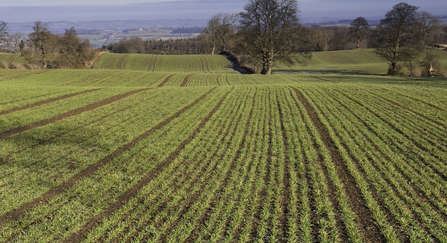On Thursday, 26th January, Defra published more details on the Environmental Land Management schemes (ELM) that farmers have been clamouring for. Whilst many questions remain, The Wildlife Trusts, RSPB, and The National Trust welcome a significant step in the right direction for a scheme which had lost its way in recent months.
Farming announcement today a welcome step in the right direction

Sluggish progress, a lack of transparency, and an apparent erosion of ambition have plagued the development of the UK Government’s ‘flagship’ ELM schemes. But today, Defra have set out much needed details of what actions farmers will get paid for in 2023, bringing forward new payments to incentivise a reduction in the use of damaging pesticides, more efficient use of nutrients to reduce pollution, better management of hedgerows, and support for wildlife by providing habitat for birds and pollinators.
This presents a much more rounded offer rewarding farmers to take action for nature, and we hope that many more farmers will enter into the Government’s ELM schemes this year.
We are also encouraged to see a further round of investment in the popular Landscape Recovery scheme, which was hugely oversubscribed in its first round of applications last year. This scheme has the potential to unlock huge benefits for nature and rural communities, and we hope this latest round will build on the exciting Landscape Recovery projects already up and running.
Getting these schemes right is essential to help tackle the nature and climate crises, which is so critical to ensuring long term food security.
But it isn’t all good news. Whilst many of the nuts and bolts of a good delivery vehicle are there, Defra has made several decisions that could undermine the effectiveness of the schemes. For example, the introduction of the “management payment” for the Sustainable Farming Incentive (SFI) could see more than £60 million spent on administration payments, potentially breaching the Government’s commitment to public money for public goods.

Early Oat Fields, Haregill Lodge Farm, Ellingstring, North Yorkshire - Paul Harris/2020VISION
Defra has put no safeguards in place to ensure the management payment of up to £1,000 per year is only available alongside the adoption of substantive environmental actions. Instead, this payment may be available even for SFI applications that only include one or two simple actions. This risks a significant degree of deadweight – reducing the budget available for rewarding farmers for more ambitious actions under ELM.
Key questions also remain about the future of the SFI, and how Defra will build on the offer set out today. While the SFI supports farmers to take action for nature, we are cautious about the ‘free-choice’ approach planned for 2023. Experience shows that this risks delivering poor outcomes, so we encourage Defra to set out a clear pathway for encouraging and rewarding farmers to go further and deliver win-wins for farming and nature as soon as possible. Packaging up actions into standards or ‘set menus’ will help to ensure greater outcomes from SFI uptake.
We also need to see greater detail on how Defra will develop Countryside Stewardship to ensure the right actions are targeted in the right place, and that land managers will be supported to deliver actions tailored to their local context, supported by trusted advice. If Countryside Stewardship is to deliver on the ambition set by the Local Nature Recovery scheme and do the ‘heavy lifting’ for nature’s recovery, then there must be a significant step change in its ambition in future years.
Finally, we urgently need to see what the future regulatory framework for farming will be. Cross compliance, the thin line of requirements which aim to safeguard our environment from the most damaging of farming practices, will cease to exist from 2024 and Defra have still shown no details on what regulatory baseline will replace it.
Defra are at a crossroads in the development of ELM, but today’s announcement represents a positive step in the right direction. We look forward to working with Government to build on the consensus reached between farming and environmental organisations last week, and ensure that the future of ELM helps deliver the legally binding long-term targets for nature and climate and supports a sustainable and resilient future for farming in England.
Sam Hanks, Suffolk Wildlife Trust’s Wilder Landscapes Manager said, “We are broadly happy and supportive of today’s announcement and heartened to see that farmer collaboration is included in the Countryside Stewardship Plus scheme. Suffolk Wildlife Trust is already working with a number of farming clusters, and we’ve seen a real appetite for collaboration already in our county. We’re working on a pilot Landscape Recovery project in the Upper Waveney and Little Ouse catchment, which, although still early days, shows lots of ambition for positive outcomes for nature. Whilst this is a good step forward, there’s still much to improve. Government do need to take issues such as pesticide use much more seriously and work on solutions to this, and other practices that harm nature, to reverse the biodiversity crisis.”
